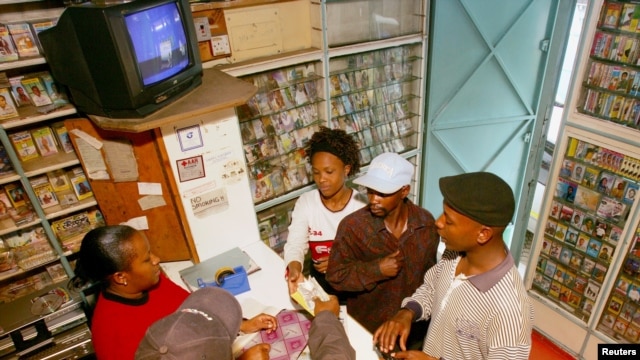 |
| Some Kenyan filmmakers have been inspired by the success of Nigeria's film industry, whose content is available at this shop in Nairobi, July 14, 2006. |
CAPE TOWN — Nigerian films don't often make
it to Western cinemas, but Nigerians living abroad can now see their
favorite “Nollywood” movies thanks to a London-based Internet startup.
Jason Njoku, a 31-year-old Londoner of Nigerian descent, got the idea for his company iROKOtv.com when his mother asked him to get her some DVDs of Nigerian movies and he couldn't find any online.
“People are definitely desperate for African content, not just in Africa but in the diaspora,” Jessica Hope, iROKOtv's communications officer, said on the sidelines of the AfricaCom telecoms conference in Cape Town.
“If you lived in Malaysia, where there are a lot of Nigerians, how do
you get hold of a Nollywood DVD? Access has been the issue.”Jason Njoku, a 31-year-old Londoner of Nigerian descent, got the idea for his company iROKOtv.com when his mother asked him to get her some DVDs of Nigerian movies and he couldn't find any online.
“People are definitely desperate for African content, not just in Africa but in the diaspora,” Jessica Hope, iROKOtv's communications officer, said on the sidelines of the AfricaCom telecoms conference in Cape Town.
Although popular across Africa, “Nollywood” content had not been aggregated by anyone for an online audience, missing out on a potential market of millions of African emigrants.
Nigeria's film industry is one of the world's biggest, churning out some 3,000 movies every year with revenues of an estimated $300-500 million.
Three years from its founding, Njoku's iROKOtv.com online video library has 5,000 titles of popular Nollywood titles and gets a million unique hits monthly from 178 countries around the world.
Most visits are from the African diaspora, with half them from the United States and United Kingdom. Although 95 percent of the content is free, iROKOtv is now making money from 22,000 subscribers paying $5 for 12 new movies each month, Hope said.
iROKOtv has attracted the interest of U.S. venture capitalists who have raised a $13 million kitty for an online platform and content, Hope said.
The company expects demand on the continent itself to skyrocket once Africa has more reliable and cheaper broadband.
In Western countries, iROKOtv's demand peaks after working hours, but in Nigeria, activity picks up in late morning as workers log on to free Internet at the office, Hope said.
“That is the only way they would ever be able to watch or stream,” Hope said.
Only 5 percent of traffic is from Nigeria, she added.
Internet bottleneck
iROKOtv has launched a mobile phone site so fans in Africa with scant Internet access can view free trailers, news and gossip clips on their phones. Nearly half of the traffic to that site is from Nigeria, highlighting the need for iROKOtv's content.
Although piracy remains the bane of “Nollywood”, iROKOtv has added DVD sales in cities like Lagos and Johannesburg, banking on higher quality and presentation to draw customers, despite charging higher prices than for pirated materials.
It has had to pay as much as $20,000 for an online license for a film although prices can be as little as $1,000 per title.
The company has spent $5 million on content and co-funded 60 movies in 2012 to expand its stable and operations, which employ about 80 people.
But until Internet connectivity picks up in Africa, iROKOtv will have to be content with five percent subscriber growth every month, Hope said.
“If we had 10 percent of Africa logging on to iROKOtv, I would be buying champagne now, the company would look completely different,” she said.

No comments:
Post a Comment
Disclaimer: Comments on this blog are the uninfluenced thoughts and opinions of blog readers.
For advertising or other relevant enquiries: Call: +234 708 819 7609, +234 703 781 7240
Email: enquiries@naijacreative.com, ads@naijacreative.com